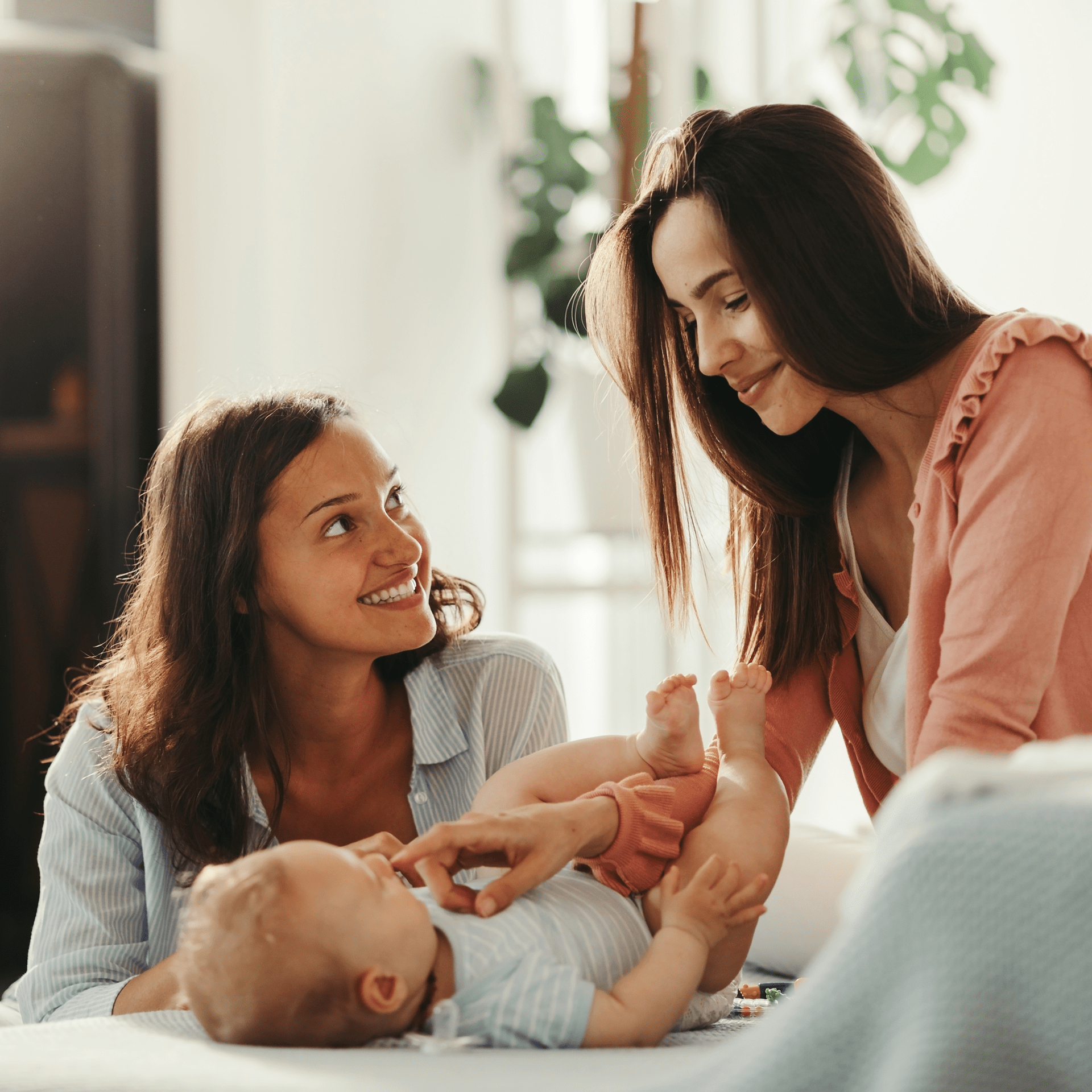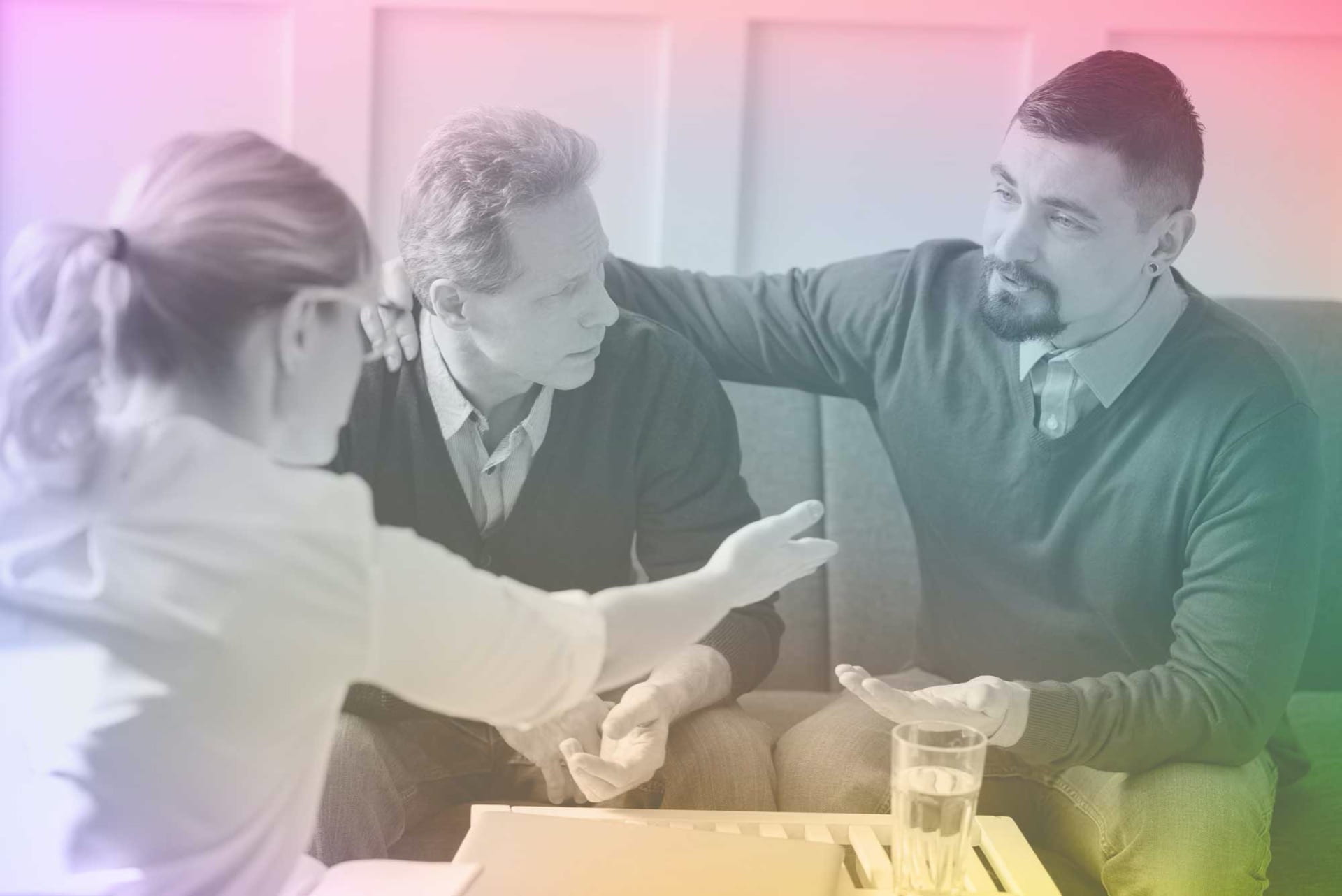Supporting LGBTQ+ people becoming parents
The decision about whether to have a child is one of the most monumental that most people will make. It reverberates throughout the life course, from the costs and responsibilities associated with raising a child to the support available from children when parents reach old age.
Unfortunately, for the millions of Americans who identify as sexual or gender minorities (LGBTQ+), the decision to have children can be more expensive, complicated, and fraught than it is for other Americans. Recent research has found that lesbian women and gay men are less likely to become parents than their heterosexual counterparts.
Samantha Tornello, assistant professor of human development and family studies and Ann Atherton Hertzler Early Career Professor of Health and Human Development, works to understand and remove barriers to parenthood for people who are sexual and gender minorities. Her research examines the intentions, attitudes, and experiences related to parenthood of sexual and gender minority people.
“My work shows that—in order to allow all people the ability to choose to have children—medical and adoption costs must be reduced, stigma and discrimination associated with being a sexual or gender minority person and parent must be addressed, and high quality, culturally-competent medical care for LGBTQ+ people must be available,” Tornello explained.
Prior research has shown that the children of LGBTQ+ parents are developmentally and psychologically indistinguishable from the children of cisgender heterosexual parents. Despite this, prospective LGBTQ+ parents face a series of legal, financial, biological, and social barriers to parenthood. While cisgender heterosexual people may face related issues, including infertility, the barriers are much more common for people who are sexual and gender minorities.
“
People deserve the choice to become a parent. We should make sure that every kid who needs a home, has a home, and everyone who wants children has that option in their life.
— Samantha Tornello
”
Barriers to parenthood
In 2015, The United States Supreme Court ruled that the Fourteenth Amendment requires all states to grant and recognize marriages between people of the same sex. The ruling provided concrete legal protections for some LGBTQ+ people, but it did not solve all legal issues associated with LGTBQ+ parenthood.
Currently, multiple court cases are attempting to deny LGBTQ+ people the right to become adoptive or foster parents. Additionally, 11 states have laws that allow discrimination against LGBTQ+ people as potential adoptive or foster parents. In these states, many foster care and adoption agencies will not place children with LGBTQ+ people. The same agencies often will not work with or place LGBTQ+ children. Tornello’s research has shown that most LGBTQ+ potential parents are fearful to work with adoption agencies due to concerns about discrimination.
Author
Aaron
Wagner
states allow discrimination against LGBTQ+ people
in the child U.S. child welfare system every year
Adoption is an important pathway to parenthood for many LGBTQ+ people. Tornello found that the majority of young, cisgender gay men who become parents do so through adoption. In another study, Tornello found that the majority of childfree, transgender women wanted to become parents through adoption or foster care. Her research also showed that the majority of potential transgender parents were significantly more open to adopting or fostering children who are typically considered ‘difficult to place’ or ‘high risk,’ such as older children; children of color; children with mental, behavioral, or physical disabilities; and children who identify as sexual or gender minority individuals.
Every year, there are about 400,000 children in the custody of the United States’ child welfare system. Agencies in some states potentially reject prospective LGBTQ+ foster and adoptive parents because of their sexual orientation or gender identity while thousands of children lack homes and proper care.
Aside from the legal barriers, LGBTQ+ people also face unique challenges when navigating the health care system.
For two people to create a child, they need access to three basic components: sperm, an egg, and a uterus that can/will carry the pregnancy. For LGBTQ+ couples, the barriers they face depend on which of those three components they have access to.
Sperm can be obtained with relative ease and at reasonable cost from sperm banks or a known donor. Because of this, parenthood is often more obtainable for cisgender women, regardless of their sexual orientation. Eggs can also be obtained, but this process is more expensive and invasive than a sperm donation or artificial insemination.
For cisgender gay men who want to be biologically related to their future child, the biggest barrier is finding a surrogate to carry the pregnancy. This is one reason why gay men are less likely to become parents compared to other people who are sexual minorities.
“Medical professionals are often not trained to work with LGBTQ+ individuals,” Tornello said, discussing another barrier in the health care system. “Consequently, medical workers don’t possess the correct vocabulary to address topics of sexual orientation and gender identity. As a result, they can make offensive and discriminatory statements.”
Cost is yet another massive barrier to becoming a parent. Medical, adoption, and legal fees can quickly put parenthood out of financial reach. Some, though not all, of the barriers described above can be ameliorated with enough money, but wealth does not equate to fitness as a parent.
Additionally, experiences of stigma, discrimination, family rejection, and lack of legal protections often affect LGBTQ+ individuals who want to start a family. Tornello surveyed and interviewed 30 same-sex female couples about their experiences of family planning, pregnancy, and birth. The women described hundreds of different acts of stigma, discrimination, or ignorance from family, friends, and medical professionals that made their family-creation process even more challenging and emotionally painful.
“All major associations in United States, including the American Psychological Association and the Academy of Pediatrics, have affirmed that children with sexual and gender minority parents develop indistinguishably from other children. The research is clear: people, regardless of sexual orientation or gender identity, can be excellent parents,” Tornello explained. “People deserve the choice to become a parent. We should make sure that every kid who needs a home, has a home, and everyone who wants children has that option in their life.”
A personal story of parenthood
The issues associated with LGBTQ+ parenthood can best be understood by examining the challenges faced by individuals. The experiences described below occurred to a married lesbian woman over the last decade. Her name has been changed due to concerns about some of the issues described above.
In 2013, Jane and her wife were expecting their first child. They had been married in New York state where marriage between same-sex people was legal, but they were living in Virginia where their marriage was not recognized. Jane consulted an attorney to make sure that her and her wife’s names could both appear on the baby’s birth certificate as parents.
“Because Virginia did not recognize our marriage,” said Jane, “our attorney told me, ‘You make sure you get over the border and into Washington D.C. before you have the baby.’ I was carrying our child. If the baby had been born in Virginia, my wife would not have had legal rights as a parent. If something had happened to me, and my wife’s name was not on the birth certificate, the child could have been taken away from her.”

Jane and her wife lived hours from D.C., but they traveled there for regular prenatal appointments. They lined their car with plastic and feared the possibility of giving birth while making the trip. Eventually they drove there when Jane went into labor, and her son was born in Washington D.C.
Before both mothers could be identified on the birth certificate, their son had to live six months under their joint care, and the couple had to complete a second-parent adoption. After returning to Washington D.C. for a court date, a judge determined both mothers to be legal parents. Only then were both parents identified on the birth certificate of their son.
“
Our attorney told me, ‘You make sure you get over the border and into Washington D.C. before you have the baby.’ I was carrying our child. If the baby had been born in Virginia, my wife would not have had legal rights as a parent.
”
Jane’s second child was born just before the Supreme Court legalized marriage between individuals of the same sex across the nation. Even though Jane—who by this time was living in Pennsylvania, which recognized her marriage—was named on her second child’s birth certificate, she was concerned, as many same-sex couples are, that marriage may not guarantee complete or permanent parental rights for same-sex couples. Tornello’s research has shown that many same-sex couples fear that marriage equality could be overturned, which could render the birth certificates invalid.
As a result, Jane completed a stepparent adoption. This process required the ability to navigate the legal system and the money to pay the associated fees, and it was only necessary because she was in a same-sex marriage. In Pennsylvania, it is still unclear if stepparent or second-parent adoptions are necessary for same-sex couples who want to guarantee their full parental rights.
“Throughout our legal and medical systems, there are barriers that discourage sexual and gender minorities from having children,” Tornello said. “Some of these are based on a lack of knowledge or services, and some exist exclusively to discourage LGBTQ+ individuals from becoming parents. Not everyone has the financial means, the ability to navigate the legal system, and the flexibility to travel to a neighboring state that others may have. Removing these barriers is an issue of human rights.”
Author
Aaron Wagner
Discover More
Research Impact
No Results Found
The posts you requested could not be found. Try changing your module settings or create some new posts.
In the News
No Results Found
The posts you requested could not be found. Try changing your module settings or create some new posts.
Student Experience
No Results Found
The posts you requested could not be found. Try changing your module settings or create some new posts.
Health Disparities
No Results Found
The posts you requested could not be found. Try changing your module settings or create some new posts.

